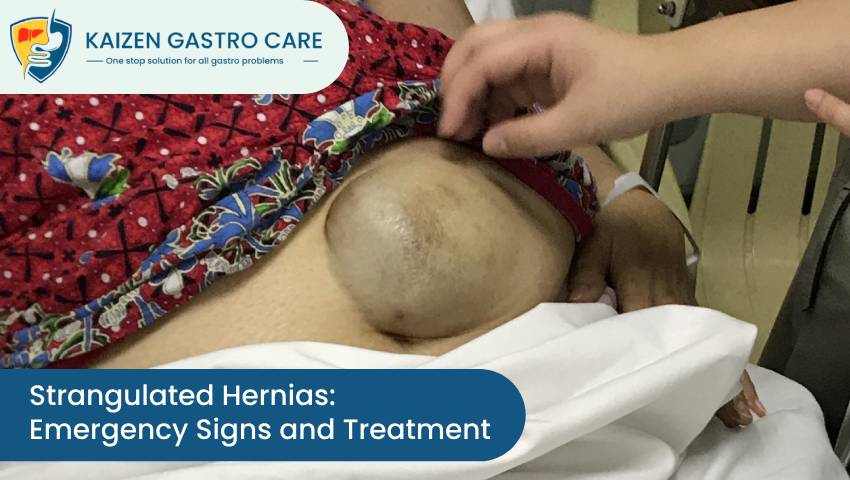
- 01/07/2024
- Kaizen Gastro Care
- 0 Comments
- Digestive Disorder
Strangulated Hernias: Emergency Signs and Treatment
A hernia happens when an organ or tissue pushes through a weak spot in the muscles or surrounding tissue wall. While some hernias might not cause immediate health problems, a strangulated hernia is a serious condition that needs urgent medical attention.
In this blog we will discuss the emergency symptoms and treatment of strangulated hernias, emphasizing the importance of seeking immediate care from specialized clinics like Kaizen Gastro Care Clinic. At Kaizen Gastro Care Clinic, Dr. Samrat Jankar is the best hernia surgeon in Pune, Maharashtra.
What is a Hernia?
Hernias can develop in various parts of the body, such as the abdomen, groin, and diaphragm. Common types include inguinal, femoral, umbilical, and hiatal hernias. They arise due to a combination of muscle weakness and strain, and risk factors include obesity, heavy lifting, chronic coughing, and aging.
What Makes a Hernia Strangulated?
A hernia becomes strangulated when the blood supply to the herniated tissue is cut off. This can lead to tissue death and severe complications such as infection or gangrene. Strangulated hernias are medical emergencies needing quick surgical intervention.
Emergency Signs of Strangulated Hernias:
Identifying the symptoms of a strangulated hernia can save lives. Here are the signs to watch for:
- Severe Pain: One of the most noticeable symptoms of a strangulated hernia is sudden and intense pain at the site of the hernia. This pain can intensify quickly and is often accompanied by tenderness and swelling.
- Redness and Discoloration: The skin over the hernia may turn red or purple, meaning limited blood flow and potential tissue death. This discoloration is a clear indication that prompt medical evaluation is necessary.
- Nausea and Vomiting: As the intestine becomes trapped and its blood supply is cut off, it can lead to gastrointestinal pain. Nausea and vomiting are common symptoms that indicate the hernia is affecting the digestive system.
- Fever: A fever signifies an infection, which can result from tissue death within the hernia. If you experience a fever along with other hernia signs, seek medical attention instantly.
- Inability to Pass Gas or Have a Bowel Movement: A strangulated hernia can obstruct the intestines, leading to a blockage. This can cause severe abdominal pain and the inability to pass gas or have a bowel movement. Such symptoms require urgent medical evaluation.
Immediate Actions to Take:
If you suspect a strangulated hernia, time is of the essence. Here are the prompt steps to take:
- Seek Emergency Medical Care: Do not delay seeking medical help. Visit the nearest specialized clinic like Kaizen Gastro Care Clinic.
- Avoid Self-Medication: Do not try to push the hernia back into place or take painkillers without medical advice. These activities can worsen the condition.
- Stay Calm: While waiting for medical service, try to stay as calm and still as possible to prevent further strain on the affected area.
Treatment Options:
The treatment for a strangulated hernia is surgical intervention. The goal of surgery is to correct blood flow to the affected tissue and repair the hernia. Here’s what to expect:
- Pre-Surgery Evaluation: At Kaizen Gastro Care Clinic, Dr. Samrat Janakr will perform a physical examination and may order imaging tests such as an ultrasound or CT scan to confirm the diagnosis and evaluate the severity of the condition.
- Surgical Procedure: The type of surgery will depend on the hernia’s location and severity. The two main surgical options are:
- Open Surgery: Involves a larger incision to access the hernia and repair the muscle wall.
- Laparoscopic Surgery: Involves smaller incisions and the use of a camera and specialized tools to repair the hernia. This technique is less invasive and generally has a quicker recovery time.
During the surgery, the surgeon will remove any non-viable tissue and repair the muscle wall, often using a synthetic mesh to strengthen the area and control recurrence.
- Post-Surgery Care: Recovery from hernia surgery involves several steps to ensure proper healing and prevent complications:
- Pain Management: Pain relief medicines will be prescribed to manage post-operative discomfort.
- Wound Care: Proper care of the surgical site is vital to prevent infections.
- Gradual Return to Activity: Patients will be instructed to avoid strenuous activities and heavy lifting for a few weeks following surgery.
Patient Education and Follow-Up:
At Kaizen Gastro Care Clinic, we believe in empowering patients with knowledge. Our team provides:
- Education: Detailed explanations of the disease, treatment options, and preventive measures.
- Follow-Up Care: Regular check-ups to monitor healing progress and manage any concerns.
- Lifestyle Guidance: Advice on diet, activity levels, and steps to minimize the risk of hernia recurrence.
Preventing Hernias and Complications:
While not all hernias can be controlled, certain lifestyle modifications can lower the risk of developing hernias or experiencing complications:
- Keep a Healthy Weight: Obesity increases the risk of hernias.
- Practice Safe Lifting Techniques: Use proper form when lifting heavy objects to avoid unnecessary pressure on the muscles.
- Strengthen Abdominal Muscles: Regular exercise can help strengthen the muscles and lower the risk of hernias.
- Quit Smoking: Smoking can weaken the connective tissues and improve the risk of hernias.
Conclusion:
Strangulated hernias represent a significant medical emergency requiring quick intervention and specialized care. At Kaizen Gastro Care Clinic, our integrated approach provides that patients receive timely diagnosis, expert surgical management, and compassionate post-operative support. Our hernia specialist Dr. Samrat Jankar specializes in diagnosing and treating all types of hernias, including emergency cases of strangulated hernias.
For more information on strangulated hernias or to schedule a consultation, contact Kaizen Gastro Care Clinic today. Your health is our priority, and we are dedicated to providing excellent care every step of the way.
